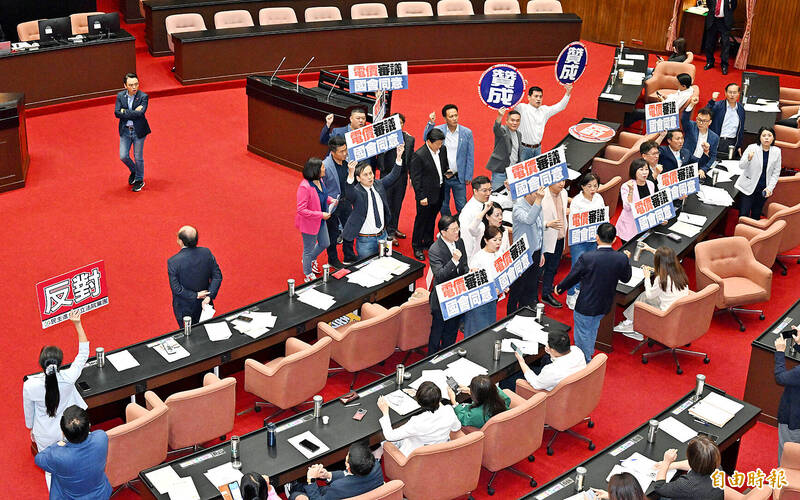《TAIPEI TIMES》KMT and TPP lawmakers vote against DPP proposal

Legislators hold placards during voting at the legislature in Taipei yesterday on a Chinese Nationalist Party’s (KMT) proposal to suspend electricity rate hikes. Photo: Tien Yu-hua, Taipei Times
AMENDMENT: Contact with certain individuals in China, Hong Kong and Macau must be reported, and failure to comply could result in a prison sentence, the proposal stated
By Lin Hsin-han, Lee Wen-hsin and Jake Chung / Staff reporters, with staff writer and CNA
The Chinese Nationalist Party (KMT) and the Taiwan People’s Party (TPP) yesterday voted against a proposed bill by Democratic Progressive Party (DPP) lawmakers that would require elected officials to seek approval before visiting China.
DPP Legislator Puma Shen’s (沈伯洋) proposed amendments to the Act Governing Relations Between the People of the Taiwan Area and the Mainland Area (臺灣地區與大陸地區人民關係條例), stipulate that contact with certain individuals in China, Hong Kong and Macau should be reported, while failure to comply would be punishable by prison sentences of up to three years, alongside a fine of NT$10 million (US$309,041).
Fifty-six voted with the TPP in opposition to the bill and 49 for, sending the proposal back to the Procedural Committee.
Shen said that he had expected this from the KMT, but had not anticipated the TPP aiding the KMT.
The TPP was not just the KMT’s lackey, but was also helping the Chinese Communist Party prevent the DPP from closing loopholes which would help safeguard national security, DPP Legislator Hung Sun-han (洪申翰) said.
TPP Legislator Chen Gau-tzu (陳昭姿) said that the proposed amendments were rough around the edges and she was solidly against double standards.
Chen, who is known for her pro-Taiwanese independence stance, said she had once been a DPP supporter, but the party has demonstrated that it was prone to forgetting promises.
Chen asked whether DPP members were all on board with the proposed amendment, citing visits to China by Minister of Economic Affairs Wang Mei-hua (王美花) and Presidential Office Secretary-General Lin Chia-lung (林佳龍) when they were head of the Taiwan Intellectual Property Office and Taichung mayor respectively, as well as Vice Premier Cheng Wen-tsan’s (鄭文燦) visit to Macau.
In other developments, opposition lawmakers yesterday used their majority in the legislature to send a proposed amendment giving lawmakers the final say in electricity prices directly to a second reading. It passed with a 58-51 vote.
The proposed revision to Article 49 of the Electricity Act (電業法) requires electricity rate changes by the Ministry of Economic Affairs’ power price review committee to be submitted to the Legislature for approval, or it cannot be implemented.
Legislation must pass three readings to become law. In the first reading, the titles of proposed bills are read out loud and then referred to the appropriate committees for review before being sent to a second reading. If a motion is seconded by at least 20 lawmakers and passes a vote, it could be sent straight through to the second reading without being referred to a committee for examination.
The amendment came after the government on Tuesday said that the electricity rate hike for last month would not be changed, despite a resolution passed by lawmakers to freeze the policy.
The opposition yesterday also sent a proposed amendment to the Securities and Exchange Act (證券交易法), which said that listed companies must share their surplus profits with employees in the form of additional wages, directly to a second reading.
新聞來源:TAIPEI TIMES















